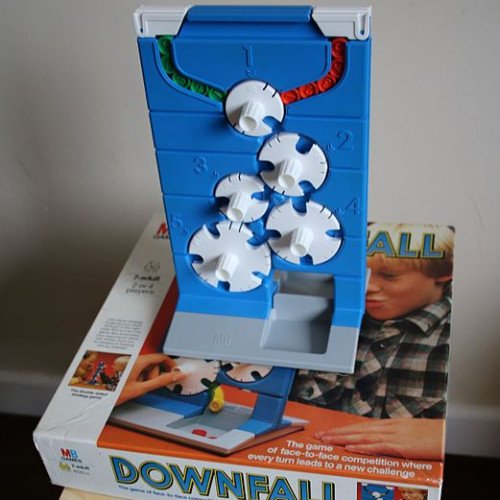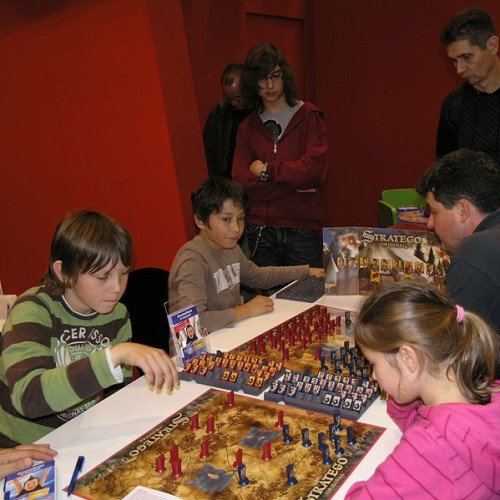DOWNFALL VS STRATEGO

DOWNFALL
Downfall is a two-player game for players aged 7 and older, first marketed by the Milton Bradley Company in 1970. The game consists of a vertical board with five slotted dials on each side. Each player starts with ten numbered tokens or discs at the top of the board. The object of the game is to move the discs to the bottom of the board by turning the dials. Players alternate turns moving the dials and cannot move a dial that their opponent has just moved. The winner is the first player to move all of their discs into the tray at the bottom. An advanced version of the rules dictates that the discs arrive in the tray in numerical order. Since neither player can see the other's board, it is common to inadvertently advance - or hinder - the opponent's gameplay. The game rewards forward thinking and planning; players may try to "trap" their opponent into turning a dial that will advance their own disc, while trying to ensure that their own discs are not caught and dropped out of order. The game is currently available in the UK under the name New Downfall, manufactured and marketed by Hasbro. The new version follows the same rules but has a more futuristic design in red and yellow. The game's box art is parodied on the cover of Expert Knob Twiddlers, an album by Mike & Rich (Mike Paradinas & Richard D. James).
Statistics for this Xoptio

STRATEGO
Stratego is a strategy board game for two players on a board of 10×10 squares. Each player controls 40 pieces representing individual officer and soldier ranks in an army. The pieces have Napoleonic insignia. The objective of the game is to find and capture the opponent's Flag, or to capture so many enemy pieces that the opponent cannot make any further moves. Stratego has simple enough rules for young children to play but a depth of strategy that is also appealing to adults. The game is a slightly modified copy of an early 20th century French game named L'Attaque. It has been in production in Europe since World War II and the United States since 1961. There are now two- and four-handed versions, versions with 10, 30 or 40 pieces per player, and boards with smaller sizes (number of spaces). There are also variant pieces and different rulesets. The International Stratego Federation, the game's governing body, sponsors an annual Stratego World Championship. The name Stratego was first registered in 1942 in the Netherlands. The United States trademark was filed in 1958 and registered in 1960 to Jacques Johan Mogendorff and is presently owned by Jumbo Games as successors to Hausemann and Hotte, headquartered in the Netherlands. It has been licensed to manufacturers such as Milton Bradley, Hasbro and others, as well as retailers such as Barnes & Noble, Target stores, etc. The game box contents are a set of 40 gold-embossed red playing pieces, a set of 40 silver-embossed blue playing pieces, a glossy folding 15 1⁄2 in × 18 1⁄2 in (39 cm × 47 cm) rectangular cardboard playing board imprinted with a 10×10 grid of spaces, and instructions printed in English on the underside of the box top. The early sets featured painted wood pieces, later sets colored plastic. The pieces are small and roughly rectangular, 1 in (25 mm) tall and 3⁄4 in (19 mm) wide, and unweighted. More modern versions first introduced in Europe have cylindrical castle-shaped pieces. Some versions have a cardboard privacy screen to assist setup. A few versions have wooden boxes or boards.